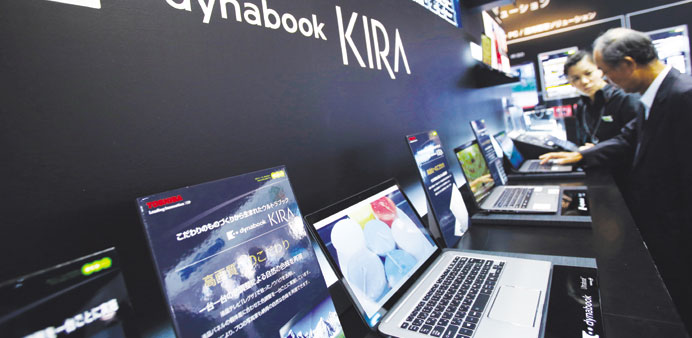An attendee (right) speaks to a booth assistant as he looks at a Toshiba Dynabook Kira ultrabook at the CEATEC 2013 exhibition in Chiba City, Japan. Toshiba said yesterday it is in the final stages of nailing down a majority stake in a British nuclear power consortium after one of the joint shareholders agreed to sell the Japanese company its 50% stake.
Toshiba Corp said it is in the final stages of nailing down a majority stake in a British nuclear power consortium after one of the joint shareholders agreed to sell the Japanese company its 50% stake.
Securing a long-awaited majority holding in the NuGen consortium would guarantee a $14bn deal for Toshiba’s Westinghouse unit to supply three reactors for the project, Toshiba’s Chief Executive Hisao Tanaka told reporters in Tokyo.
A deal for majority control, including part of French utility GDF Suez’s 50% stake, could be in place as early as January, Tanaka said. That would allow Toshiba to kickstart an ambitious reactor building programme that stalled after countries around the world froze nuclear expansion plans and regulations were tightened in the wake of Japan’s 2011 disaster at Fukushima.
Spanish utility Iberdrola SA, which is selling assets to reduce debt, said on Monday it has agreed to sell its 50% stake in NuGen to Toshiba for £85mn ($139mn), subject to final approvals, terms and conditions.
Tanaka refused to confirm the details of Iberdrola’s announcement. But he said that he expected to strike a final deal with both the Spanish firm and GDF Suez.
“We want a majority to move forward,” Tanaka said. “So we would want to take some of GDF’s share, but have them remain as an operator.”
Tanaka said that a majority stake was necessary to make progress on the project, where delays have frustrated the UK government, sources say, as it pushes through its own ambitious nuclear programme to replace new reactors.
A controlling stake would allow Westinghouse, 87%-owned by Toshiba, to supply three of its AP1000 reactors for the site, where NuGen is aiming for capacity to produce 3.6 gigawatts of power. After building the reactors, Toshiba would reduce its stake, Tanaka said.
“We are thinking about an exit, but we haven’t decided anything yet. We will reduce our majority stake over time. We are a plant provider, not a nuclear power provider,” he said. Tanaka said revenue from the project, including the reactors, was expected to be around ¥1.5tn ($14.4bn).
Toshiba remains on the lookout for a buyer for 36% of Westinghouse, which would leave it with 51% control of the business. But Tanaka reiterated that Toshiba was in no rush to complete a sale, after previously stating that it was looking for an engineering company with expertise in building nuclear plants.

